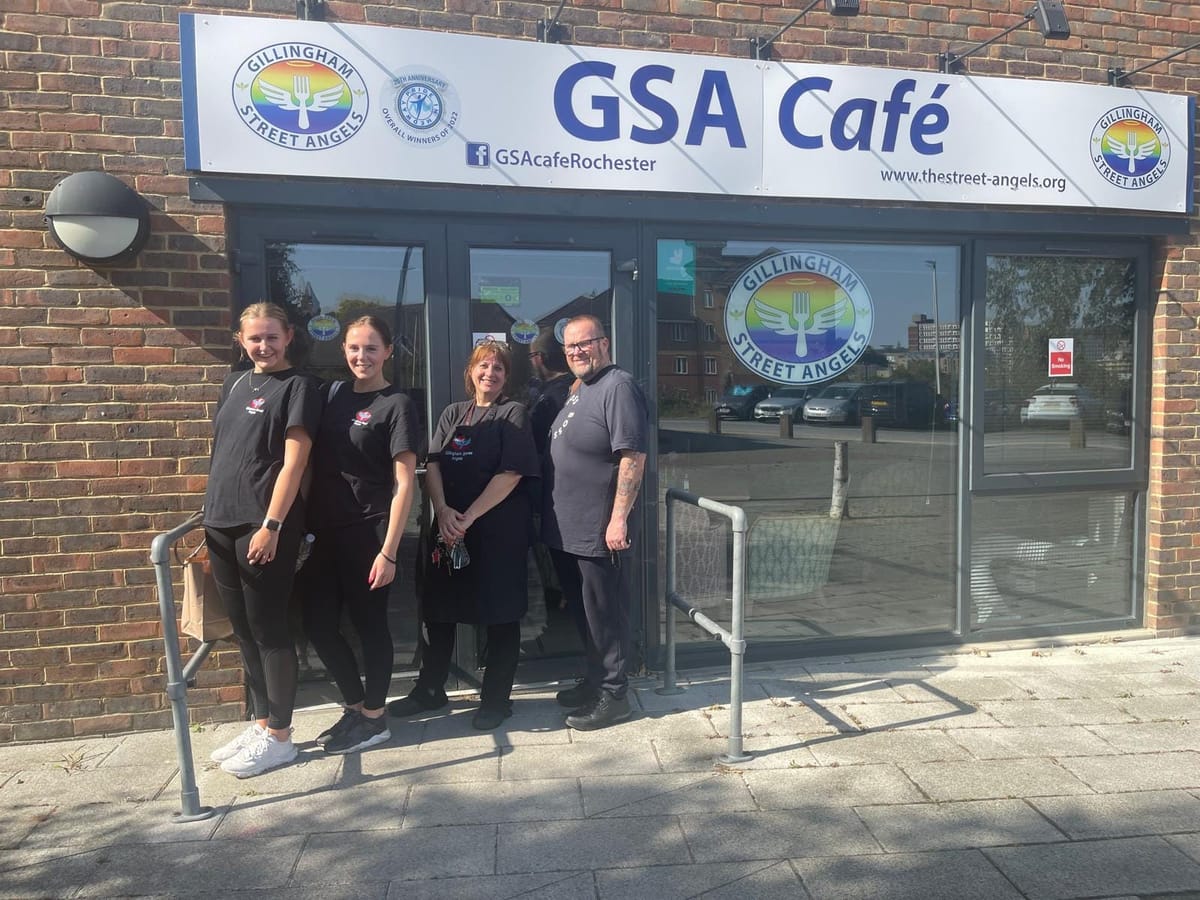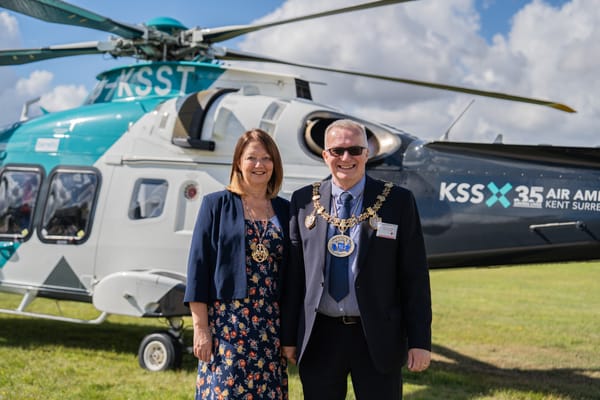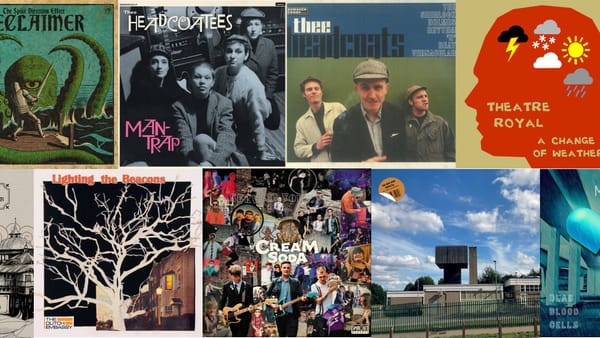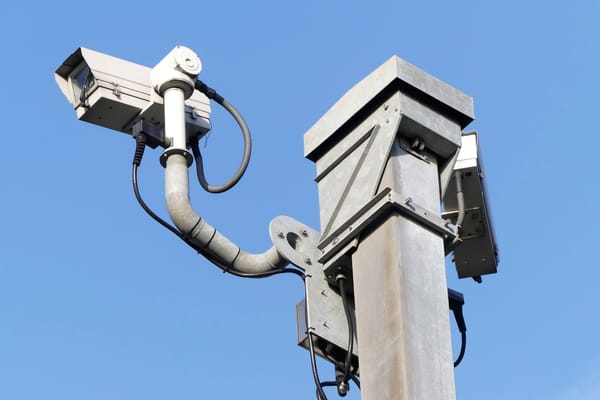"People don't like the business side of it”
What Steven asked Neil Charlick, Chief Executive of local charity the Gillingham Street Angels

Neil Charlick set up the Gillingham Street Angels in 2018, and since then, it has grown to become one of the largest and most recognisable charities operating in Medway. Steven met Neil at the GSA Café in Rochester to discuss Neil’s own experience of homelessness, why a charity needs to be run as a business, if they are really feeding 25,000 people a month, and why he went on Nigel Farage’s show.

Where were you born?
I was born in Barking in Essex.
What brought you to the Medway towns?
My wife. I met Tracy online. Came to Medway, met Tracy, spent a bit of time here and decided to move to Medway.
What jobs did your parents do growing up?
Dad was a barrister's clerk. Mum was an accountant.
How did you find school?
I was a pain in the backside, to be honest. Didn't really pay much attention. Recently diagnosed ADHD and dyslexic. So school was a bit of an issue. I left at 16 and went to catering College, qualified as a chef. Never ended up doing it professionally. Just went in to be a barrister’s clerk with my dad.
Is that why you're doing the catering now?
I've always done different things. I love the catering. I still do love the catering. The café where we sit now benefits us in a couple of ways. We obviously want to try and make money to pay for the charity. But also, these boxes you see going out now…
Volunteers are taking boxes of food from the kitchen.
This is all stuff being cooked for tonight's soup kitchen. We have a soup kitchen tonight. About 200 people will be fed at that soup kitchen. And the kitchen has given us the way of being able to cook. We cook for another charity. We cook for a couple of what we call food initiatives through churches. We cook a lot of stuff for the food bank itself. People who come, who are homeless, who haven't got any cooking facilities, we're able to actually cook meals, drop them off to the food bank, and they've got between 100 and 200 a day that are then ready for people to eat. Some people can't afford to turn the electrical cooker on. Some people just haven't got the cooking facilities.
How did Gillingham Street Angels begin?
When I came to Medway, I was with another group originally…
Would that be Medway Street Angels?
Yeah. When I came to Medway, I thought to myself, there is a lot of homeless. Just started helping them one day a week. Thursday evening, used to meet at seven o'clock in Strood Morrison's car park. No one really knew what was going on back then. We would literally walk for hours and hours through fields, just looking for homeless people, and then we'd find them and say, ‘Do you want soup?’, literally made out of a tiny little soup maker.
It grew from that. The Medway Street Angels, we split our own ways. We went to Gillingham, and that's when it changed for me, really. We started doing more and more. We needed somewhere to store the stuff, because it was just getting too big to just use the cooker at home.
Covid was the big change. People struggled. A lot of charities pulled away. They just said, ‘No, we're shutting our doors. We're not doing anything during covid.’ A lot of the food that was being given out, the Muslim Welfare Association locally have been amazing for us. They were still collecting the food. They were just dropping it for us. What people were finding was they didn't want to give it out. They didn't want to risk contact. A lot of people just used us as a hub at the Skinner Street Food Bank.
The council were really supportive. The police were really supportive because no one else was open, and at the time, no one really knew what was going on. We had it outside, laid it out like a market. You'd have the two metres that people required, they could come along and take the food they want, and it just grew. If you look on the Charity Commission, look at our accounts, and what we've done in five years.
Have you ever experienced homelessness yourself?
That was the thing I was interested in. I was homeless. When I was younger, I was a pain in the bum. I was naughty, and I thought the only way I would change was to move. I moved to Bournemouth, which seemed like a great idea at the time. I had no money, no support network down there, nothing at all. Ended up down there with nowhere to go.
How old were you at the time?
I was 30 and had no support network. My mental health was struggling, and it was a bad idea. I had nothing, so I ended up being homeless in Bournemouth. Very lucky that I got myself back on my feet in a strange kind of way as well. I’ve always been quite resourceful. I just fished, sold the fish to restaurants, got myself enough money to buy a suit, and did some door work down there. The DJ one day said, ‘I've got a room to rent,’ rented a room, and got myself back on my feet. Just got myself into a better place.
Do you have any additional roles, paid or unpaid?
No. Everything I do is GSA. I'm very hands on. I don't sit behind a desk all day. I do a lot of cooking here. I spend a lot of time in the shops, testing things, helping them fix things. I like to be hands on. I do a lot of the outreach work for myself with the homeless. I'm not a sit still kind of person.
What does an average day entail?
Well, it's quite a long day most of the time, particularly with the café. We source ingredients from various places in London. Normally 12 o'clock at night, three days a week, me and one of the ladies here go off to Spitalfields market to buy fruit and veg. We go to Billingsgate market to get fresh fish and Smithfield’s for the meat. Although this is a cafe, it's not a restaurant, we do try and produce some really good stuff here. It's a passion of mine, I want it to be good. I don't just want to do the sausage roll on a tray type of thing. I try and put a lot of effort into it.
When you're buying stuff, are you getting charity discounts?
Some people know. A lot of them know who we are, most of them don't have to give you a discount. A lot of them will look after you and say, ‘We'll knock something off because you are a charity.’ They're aware of what we're doing. That's a good thing for us, but we still have to pay. If you go to Tesco's and buy a leg of lamb and you go to Smithfield's, it's a different thing. When it comes out, it looks different. It's fresher. It's better quality, and it is cheaper. You're better off if you can put that kind of time in. I don't sleep very well. We’re going out at 12 o'clock, we get back here, say, 6 o'clock, drop the stuff here, refrigerate it, and then I go off to do what I call my ‘normal days’ work, which would be at the office. I'll go into the office. We have a meeting in the mornings with all of us to see what's going on, what needs to be done. We've got a transport manager, a warehouse guy, what they're doing for the day. I said I'm not great at sitting still, so if they need me here, I'll come back to the café, or where Argos was, I go down there. I just like to be more hands on. What I don't want to be doing is sitting still.
When do you rest?
I'll go home, say at 7 o'clock, I'm going to sleep. I normally get about 5 hours sleep. I'm not great at sleeping. My mind is too active. I think that's part of ADHD. I'm just too active all the time, I want to be doing things. If I do sit still for a long period of time, it does affect me. I've got a lot on my shoulders. I've got a lot to worry about. A lot of people rely on me, so it does worry me.
As you discussed, GSA is staggeringly big. Is there any plan to update your governing documents?
Yes, I think I should say that that's just being done at the moment.
As the name dictates, it’s very Gillingham specific, but now...
The thing is, who do you not feed? It was Gillingham. Originally, when we spoke to the Charity Commission, we just asked to be called ‘The Street Angels’, but they said no, that was too open. We just put Gillingham because we were in Gillingham. We feed people in Rochester, Chatham… We also do stuff in Broadstairs.
Online, you're saying you're feeding 25,000 people a month. Does that include through the cafés?
No. Those figures are worked out by if you came to the food bank, you would ask for food. We ask very minimal questions. Who are you feeding? You would tell me, ‘My partner, my two children,’ so that's four people. You might not see 25,000 people actually attend the food bank. You might see 10,000, but they're feeding 25,000. The figures are worked out by who attends the food bank, who attends our warehouse for food, who is fed at the soup kitchens, who is fed at the food initiatives. It's crazy. Again, I don't even like saying it. Do I want it to be 25,000? No, because the infrastructure behind feeding those people is huge. You know, I've had to buy things. The little vans to start with. There are 11 vans on the road. There are three vans that are just food. All they do all day is collect food. Collect food, drop it off. They've all got to be refrigerated vans. We need a forklift truck to load things. We've got seven walk-in fridge freezers. The infrastructure behind getting that done is huge.
Where are you getting that food from?
We're really lucky. We've got a lot of companies that give us stuff. Originally, we just used Fareshare. Covid, again, was a change because people, even Fairshare, struggled during covid. People couldn't pick it up. People didn't want to pick it up. They didn't have the drivers to do it. But we had a core of people who carried on doing what they were doing. A lot of companies, Morrisons at the time, were giving us huge amounts of food. We were going three times a day. We were probably getting, on a good day, 15 pallets of food from Morrisons. We've got wholesale suppliers giving us food, small local shops giving us food, general members of the public bringing stuff in. When you're looking at 25,000 people, I need 100,000 tins or bottles a month. That is a huge amount. We've had to spend a lot of time, and we've got a really good team, getting some amazing stuff to make it possible to do what we do. Because that's a lot of food.
Your charity tagline is now ‘We're not just a homeless charity anymore.’ Can you name all the different ventures the charity is currently involved in?




